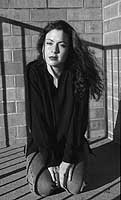|
"There is, in the end, the letting go..." |
||
 |
 |
|
|
Headline: AHTRAP1.STO Publish Date: 05/20/1993 By Marya Hornbacher There are things in life that make no sense. Calculus, for example. Why pay-dryers eat underwear. French grammar. The Trap, running at the University Theater through May 22, makes no sense. But then, theater doesn't have to be sensical. Still, all odds are against student director Gulgun Kayim in trying to sort through the life and twisted times of writer Franz Kafka. An illogical series of events, a historically inaccurate setting, a madman for a main character and a rotten ending should, logically speaking, trip up Kayim and her 20-member cast. The Trap shouldn't be good. Strangely enough, it's excellent. The play stumbles to a start with a child Kafka (Eric Weisengrubber) playing alternately petulant and perverse. Polish playwright Tadeusz Rozewicz makes a none-too-subtle (and none-too-successful) attempt at child psychology, and Weisengrubber is clearly unsure how to handle a poorly-written role in which Kafka struggles with his relationship with his father. Lou Mackert is fantastic as the father, a bellowing, volatile jackass whose presence fills the stage -- and, according to Rozewicz' interpretation, Kafka's later life as well. On the heels of Mackert's stunning introduction comes the play's crown jewel: David Ivers as the adult Kafka. Ivers alone is enough to make this play worthwhile. His role is the center of the play -- not, as the playwright seems to think, the arbitrary setting of 1940s Nazi Germany. As soon as he wanders onstage, The Trap spins off in a dark, surreal blur of madness, obsession and mindgames. The play makes no attempt at factual accuracy. In her director's note, graduate student Kayim instructs the audience to take it rather as "a resonance of Rozewicz's experience of annihilation of matter and the body." In other words, we're supposed to ignore the incredible distraction of a World War II play fighting Kafka for center stage. Kafka was wormfood by the time Nazism took hold, and the connecting theme -- annihilation -- is questionable. But this is theater. We can suspend disbelief; Rozewicz and Ivers as Kafka paint a dark and abstract picture of the human mind. Author of such classic psychological horrors as "Metamorphosis" and "The Hunger Artist," Kafka seems an obvious subject for such a portrait. In this production, he is a paranoid psychotic, obsessed with cleanliness, terrified of meat and utterly incapable of normal human relations. Ivers takes us on an intimate spiral inward as Kafka is essentially eaten by his work. Rozewicz uses an extremely effective technique of repeated imagery, pounding themes at the audience; in keeping with Kafka's paranoid state, objects are personified and people are objectified. By the middle of the second act, each character has taken on a degree of madness and the play has reached a fever pitch. "I am a trap," Kafka says at one point. "My body is a trap which has caught me." This body obsession seeps into his relationship with women; Kafka appears to desire a purely mental state and is disgusted by both the emotional and physical aspects of his fiance, Felice. By no means an easy role, Christene Mercherle plays Felice with passion that contrasts poignantly with Ivers' self-absorbed emotionlessness; in one painful scene, she unbuttons her blouse and presses herself to him. He turns his head and says, "I am ill." No kidding, Kafka. Highly professional and effective supporting performances by Drew Kahl, as Kafka's lone friend, and Susan Blackwell, as the object of one of Kafka's myriad obsessions, give this play a completely serious and incredibly intense feeling that carries through nearly to the end. The most moving and best-acted scene of the play is between the two friends: Ivers and Kahl pour life into their characters as Kafka tears his papers to shreds, eats them, and stuffs himself into a suitcase, crying, "I want to burn everything I have given birth to." An underlying theme of anti-intellectuality and artistic angst pervades the play. Rozewicz is clearly on solid ground with both and should have kept a tighter focus on them. Rozewicz makes the fatal mistake of sticking to his poorly-made political point, adding a WWII scene here and there where he thought he could get away with it. It takes interpretation. It takes liberties it shouldn't. But given its faults, The Trap, as performed by the University Theater, is an enormous success. This is not a spectacular play; it is, however, a showcase of spectacular performance and a powerful example of creative directorial skill. |
|